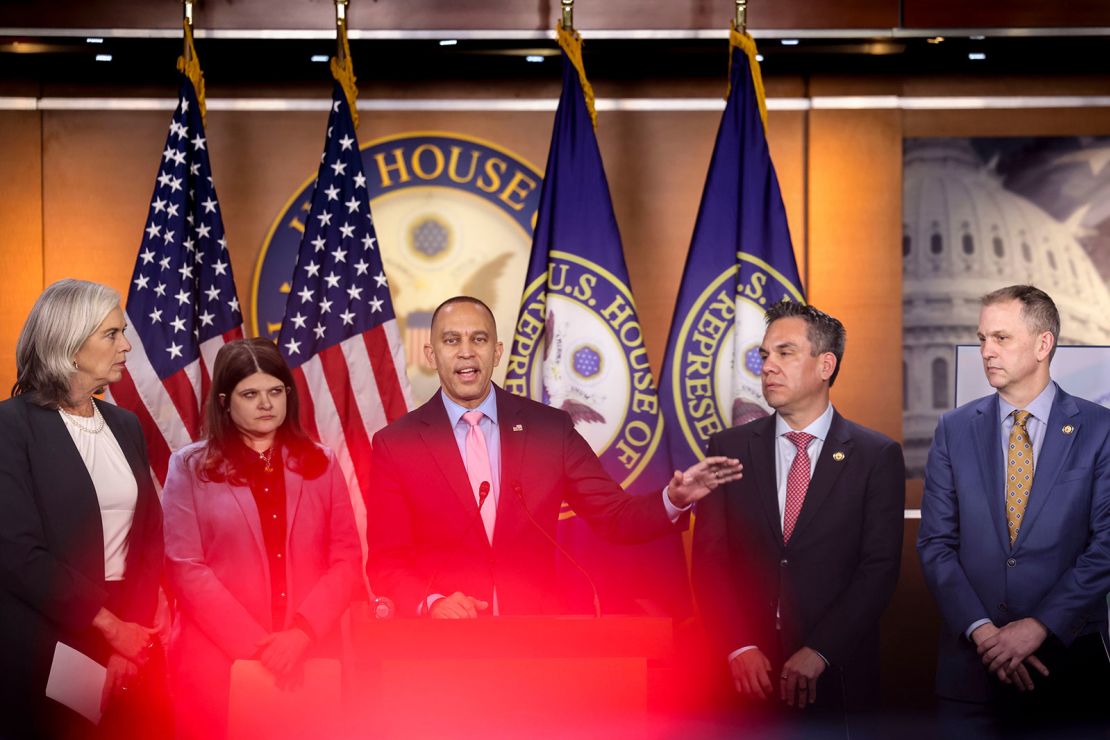CNN
—
Amid Democrats’ shock and bickering over how much to respond to President Donald Trump is a deeper question rippling through leaders across the Capitol and across the country: How much should they rely on the same institutional and procedural maneuvers they used during the first Trump term, and how much are they willing to wield their own wrecking balls?
Democrats remain essentially leaderless, with prospective future presidential candidates largely sitting back and allowing others to be the first ones through the buzzsaw of Trump and his cheerleaders, none eager to be the face of a party just yet. They are disconnected from the Democratic National Committee, where the Obama-era rallying cry of “Yes We Can!” became the watered down facsimile slogan “Yes We Ken!” for Ken Martin, the largely unknown insider who emerged as the winner of the recent chair race that the party’s most prominent figures avoided.
Those Democrats left trying to take charge doubt the slower court challenges can keep up with the rapid, precision onslaught mounting each day from presidential appointees and associates of Elon Musk. For whatever judgments do come out in their favor, many believe – though few will yet say so publicly – that Trump may soon just start ignoring what he doesn’t like, and they’ll have no recourse.
Trump dismissed this on Tuesday, telling reporters in the Oval Office, “I always abide by the courts,” just days after Vice President JD Vance had tweeted, “Judges aren’t allowed to control the executive’s legitimate power” — and days before Trump posted on Saturday, “He who saves his country does not violate any law,” a line nearly matching one that appeared in a 1970 movie about Napoleon.
What hopes Democrats have to counter Trump rest for now on the mid-March government budget deadline, the first real inflection point for a party that is not just in the minority in the House and Senate, but facing a Republican majority so in thrall to the president that they cheer him on as he rapidly absorbs powers from Congress, while they’re left holding contrived attempts to visit buildings that Trump and Musk have locked shut while they dismantle operations inside.
“I’m not going to stand by and support an effort to dismantle our democracy through the budgeting process,” said Rep. Hank Johnson, a Georgia Democrat, as he left a rally outside the offices of the Consumer Financial Protection Bureau to protest its overnight shuttering by the White House, where he and two dozen colleagues pledged not to vote for any bill until, as the co-founder of the group Indivisible put it, “this Constitutional crisis is over.”
Johnson argued that the whole mentality is different from the December shutdown threat, when Democrats also complained but ultimately provided enough votes to make up for Republican defections even though they got limited concessions. “We’ve got to do everything we can, every tool in the toolbox to oppose what is actually happening right before our eyes,” he said.
That kind of emergency protocol is crashing into Democrats in the House and Senate who remain confident history will repeat.
“I remember eight years ago when skeptical reporters were seeing protests and said, ‘Oh come on, it’s almost two years until the midterms, will people really stay engaged and energized? The answer proved to be yes. And in fact, the numbers even grew,” said Pennsylvania Rep. Brendan Boyle, as he headed on Thursday to a long hearing over the budget that Democrats hope lets them win back some ground.

Others argue they have to be the ones to hold the institutions in place, keeping their resistance within bounds of forcing debates through the night on votes they are going to lose and rallies in front of buildings that Trump has locked them out of, where they say things like “a rally a day keeps the fascists away,” as Maryland Rep. Jamie Raskin did at the CFPB rally, and then head home again with their signs.
“Clearly this is a man that is driving an agenda that’s breaking the law, violating civil service laws, violating common sense, violating fiscal prudence, benefiting corrupt practices,” said New Jersey Sen. Cory Booker, when asked by CNN if he thought Democrats were doing as much as he wants to push back on the president.
“You pull every lever that you have on things that you disagree on, but I have to say, this idea that to shut the whole place down…” Booker said, his voice trailing off, and then affirming he does not support any kind of government shutdown. “The levers that we have are limited, but at the same time, all of us share the lever of speaking out, of raising popular sentiment.”
Existential tug-of-war between going too far and not far enough
For top Democrats in and out of elected office, every day is an existential tug-of-war between worrying about sounding like shrill paranoiacs and worrying that they are not saying or doing nearly enough. They don’t know what the next three-and-a-half years are supposed to be when they already hit “Constitutional crisis” in the first three-and-a-half weeks.
“The reason people feel angry about what’s happening is not because we’re not doing everything in our power,” argued Rep. Sean Casten, a Democrat from Illinois. “It’s because they’re wondering, when in God’s name did it become partisan to defend the Constitution? Why is it partisan to say that it’s bad to give Nazi salutes? Why is it partisan to say the Reconstruction amendments that provide equal protection for all are not worth defending anymore?”
Casten, like several of his House Democratic colleagues who spoke to CNN, said he has been surprised and heartened by how many constituents have been calling into tele-town halls, and by the responses he has been hearing: “In three weeks, the public mood has gone from apathy to fear to anger. And I think the next thing in that cycle is action.”
But Casten said that activist leaders have told him and colleagues that they fear protests against Trump might eventually be used as a predicate for declaring martial law. Other House Democrats echoed this privately, and several left-leaning activist group leaders told CNN directly that their own safety concerns for participants have risen since the president’s blanket pardons for January 6 rioters.
“It only took 50 days for Hitler to destroy democracy in Germany,” Casten said, arguing that there are direct parallels to those moves and much of what Trump is doing. “Part of our job right now as Democrats in Washington inside of this is to be Churchillian, very clear-eyed about what the stakes of this moment are, what the parallels in history are, remind people that the majority of Americans are good people, and that the way you shut a bully down is to punch back.”
Trump aides regularly dismiss comments like this.
On Wednesday, White House press secretary Karoline Leavitt claimed Democrats were projecting, arguing that with judgments that have been stopping the president’s executive orders, “the real Constitutional crisis is taking place within our judicial branch.”
In the halls of the Capitol, Democrats’ plaintive hopes a few Republican allies might join them in opposing certain Trump moves is quickly curdling into scorn and disgust.
“My impression is that nothing is more miserable right now than being a Republican member of Congress. They’re at Mar-a-Lago over at the White House when he’s signing the executive orders. Are they being brought in at all to his plan? They’re not at all,” said Rep. Haley Stevens, a Michigan congresswoman. “They’re neutering their own leadership.”
Casten said as he walks around on the floor and hears Republican colleagues quietly telling him they agree with some of what he’s saying about Trump. He now sees people he suspects are so convinced that they’re in end times to feel they “are never going to have to worry about another democratic election,” or at least wouldn’t object if the situation came to that.
“How are you feeling?” he recalled a colleague asked him while they were sitting in the House chamber the other day.
“I’m feeling,” Casten said, referring to only his Democratic colleagues, “like there’s only 213 people in this room that I’d trust in a foxhole.”

Kicking off a Congressional Progressive Caucus meeting this week, new chair Texas Rep. Greg Casar read from Franklin Roosevelt’s 1936 speech to the Democratic convention, where he spoke about “clouds of suspicion, tides of ill-will and intolerance gather darkly in many places,” and said “privileged princes of these new economic dynasties, thirsting for power, reached out for control over government itself.”
“We should be talking about the fact that it is not immigrants that are raising your rent, it is hedge funds that are buying up your neighborhoods and raising your rent. It is not LGBT Americans that are screwing up, you have, your health care, it’s corporate CEOs who are,” Casar said. “If we don’t want to continue in this cycle where we win, then we lose, we win, then we lose, but we keep trending downward, we have to fundamentally transform what the Democratic Party has become in the last 25 years.”
Casar argued this will start to catch and become the pushback that still hasn’t come organically, like eight years ago.
“Pretty soon everyone’s going to be feeling it, and people are going to look back at stories from this last week or two and they’re like, that was a kind of awkward time, but it’s fine,” he said.
In polls and focus groups across an array of internal Democratic groups and allies, described to CNN, centering on talking about prices remains the most prevalent advice — and it’s where House Democratic Leader Hakeem Jeffries has kept returning to, flanked by signs at his two most recent weekly press conferences headlined “HOW IS THIS LOWERING COSTS?” and “REPUBLICANS BETRAY THE MIDDLE CLASS.”
Jeffries conceded, when pressed by CNN, that voters hadn’t bought this argument from voters last year, but he insisted the difference now is that Republicans haven’t delivered.

Jeffries, who likes baseball as much as he likes historical statistics, sees an example of Yankees slugger Aaron Judge, who has one of the highest whiff rates in baseball, but also led the league in both walks and home runs. This is a lesson, he says, in not swinging at everything.
Jeffries and Senate Minority Leader Chuck Schumer are wrangling behind the scenes about who can keep their own members in line and for what.
But with Schumer 20 years older, further in the minority now and much less likely to have a realistic shot at getting back to the majority in the 2026 midterms, Democrats’ political attention against Trump is zeroing in on the House.
Jeffries and his team believe they will have more pressure to exert as the budget talks near, with swing district Republicans in their tiny majority already signaling that they will oppose cuts the leadership is putting forward, in addition to the expected House Freedom Caucus defections.
But they are also carefully watching how public mood is shifting on the ground in the most closely divided districts, not yet convinced that voters want the kind of resistance to Trump that they or the loudest activists are demanding
Shortly before he left the Capitol to spend a week back in his own district and listening to what his members will be hearing in their own, Jeffries paused for a moment when asked what he would say to Democrats who have given up hope.
“Keep hope alive. The Trump administration is losing in court, not winning. Over and over and over again,” he said. “And they have not achieved a single legislative victory. And his approval ratings aren’t going up—they’re going down.”
The challenge for Jeffries and his fellow Democrats as they search for a way forward is the new political reality: Trump has already notched one court win on his plans to reduce the federal workforce, he signed into law a GOP-led bill to require the detention of undocumented migrants charged with certain crimes that drew Democratic support and his poll numbers are as high as they have been in his 10 years in politics.





